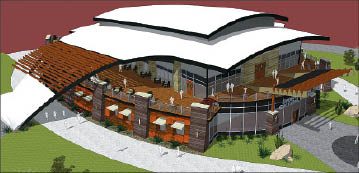Tribe amps up cultural center pitch
Spokanes envision $6 million project on river's north bank

The Spokane Tribe of Indians says it envisions spending $6 million to $8 million on a large cultural center it's proposing to develop on city-owned land along the Spokane River just west of Riverfront Park.
The 1.1-acre site, known as the Bosch lot, is located just northeast of the Monroe Street Bridge, stretching between Monroe and Lincoln streets north of Bridge Avenue, and is just west across Lincoln from the Anthony's at Spokane Falls restaurant. The city currently uses it as an unpaved commercial parking lot for Riverfront Park, adjacent businesses, and city-owned vehicles.
The Spokane Tribe's proposal was the only submittal the city parks and recreation department received in response to a formal request for proposals it issued to evaluate the potential for leasing and redeveloping the site.
The tribe has been showing interest in the property for some time, viewing the land near Spokane Falls as part of its ancestral grounds, but its new proposal is the most detailed and sweeping depiction yet of how it would like to use the site.
It envisions developing a 33,000-square-foot building there that would include various interpretive displays and exhibits, a 4,500-square-foot theater for multimedia and performing-arts uses, a 3,000-square-foot restaurant specializing in Northwest native foods, and a 1,250-square-foot gift shop specializing in tribal arts and crafts. The building, constructed of masonry, steel, and engineered timber, also would include about 6,200 square feet of general retail space, for which tenants would be sought, and about 3,000 square feet of administrative office space.
Additionally, the project would include a 3,000-square-foot outdoor performance area and landscaping that would blend aesthetically into Veterans Court, just to the south across Bridge Avenue.
The tribe says the center "would present a special opportunity to share with those outside the tribal community its traditional heritage and culture, while also showcasing and promoting its ongoing success in the modern world of business, commerce, health care, and natural resource management, as well as other contemporary disciplines." It says it would like to see the center become "an integral part of Riverfront Park's amenities and, in effect, an extension of the park."
The tribe says it would finance the project through "a combination of funding sources which may include government guaranteed loans, conventional financing, taxable bonds, and various public and private grant sources." It says it would use revenues from the facility's operation to pay lease, operating, and debt-related costs.
Preliminary renderings of the building, designed by Womer & Associates Inc., an architectural and engineering company here, show a two-story structure with lots of glass and a rounded, rippled roof—representing water—that would extend down to the ground on its sides.
Ross Kelley, president of the Spokane Park Board, said late last week that the board had invited tribal representatives to come to its regular monthly meeting scheduled for today, Aug. 12, to talk about the proposal. The board then will refer the proposal to its land and Riverfront Park committees for their review and comments before taking action on it, Kelley says. The proposal also would need City Council approval since it would involve a long-term lease of city-owned land, he says.
"We're not in a big hurry on this, and neither are they," Kelley says, referring to the tribe.
"We probably have a long ways to go to end up with an agreement," given the large number of details that have yet to be worked out, he says. "We want to do it right. This is a very prominent piece of property that's very important to downtown, so we want to get the best use out of that property."
He expects, though, that the Park Board will act on the proposal before the end of the year. One of the considerations will involve whether the cultural center could generate revenue for the city equal to or more than the roughly $70,000 a year that it gets currently from parking fees, which was one of the criteria cited in the RFP, he says.
In its proposal, the tribe acknowledges that desire by the city and says it "stands ready to negotiate a final lease cost that is fair, reasonable, and commensurate with present city revenue for the property."
Kelley says he's disappointed the department didn't receive more proposals for the site, but the poor economy probably was a factor in that lack of interest.
Of the tribe's proposal, he says, "I think the concept is good. I think what they're trying to do is what we had kind of talked about in generalities before."
The Spokane Tribe and Urban Workshop, a Spokane urban design and development studio, were the only entities to submit letters of interest to the parks and recreation department in response to an earlier, preliminary solicitation it made to gauge public interest in the Bosch site. After evaluating those responses, the department issued its formal RFP, with responses due late last month.
Urban Workshop, of Spokane, which decided not to submit a formal proposal to the city, had said it envisioned using the site for "dense, environmentally conscious (LEED certified), low-rise housing" that would contribute to an economically diverse residential base in the downtown area.
It said it envisioned the phased construction of 30 to 45 three- and four-story townhouses on the site, each of which would have about 1,500 square feet of floor space. Its vision called for the development to include private rooftop gardens and interior courtyard space, concealed off-street parking, and open light-filled floor plans.
Related Articles




